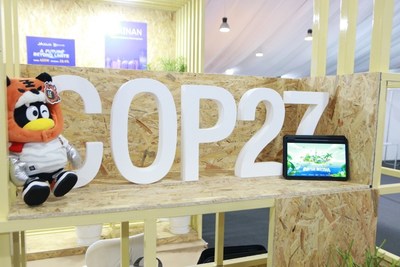At the COP27 United Nations Climate Change Conference in Sharm El-Sheikh, Egypt, in 2022, Tencent, a world-leading internet and technology company that develops innovative products and services to improve the quality of life of people around the world featured cutting-edge low-carbon technologies.
These include the first carbon mineralization storage project in Asia, rice that conserves water and is resistant to drought and zero-energy radiative cooling technology to protect glaciers.
Working with partners to restore seagrass beds and salt marsh ecosystems in pilot areas to develop marine carbon sinks- the company has also been actively contributing to nature-based solutions that leverage the ecosystem’s own abilities to heal itself and are important tools for mitigating climate change.
Officials from Tencent also provided information on their ongoing initiatives to promote creative thinking, educate the public about living sustainably, and aid in the shift to a low-carbon economy.
Read also: Engineers asks FG to control flood with tech
The first carbon mineralization storage project in Asia was presented by Xu Hao, Vice President of Tencent Sustainable Social Value (SSV) and Head of Tencent Carbon Neutral Lab, during a panel discussion on Wednesday.
This project was a partnership between Tencent and Icelandic carbon sequestration company Carbfix.
The business claimed that it is also working with university research groups to create zero-energy radiative cooling products, which allow objects to be cooled by radiating heat into space and help reduce carbon emissions.
On the Dagu Glacier in Sichuan Province, this technology is being tested in order to safeguard glaciers.
Global food security is significantly threatened by climate change. Tencent is collaborating with partners to promote a new variety of rice that is drought- and water-resistant in order to address this issue.
The project will evaluate the WDR’s capacity to reduce greenhouse gas emissions, create carbon assets, and boost its yield per acre.
Through engaging mobile applications, it will also promote the WDR’s cultivation to individual farmers.
In forest areas, customized algorithms were created to assess forestry carbon sequestration projects to reduce monitoring and verification costs.
Story was adapted from Yahoo News.
